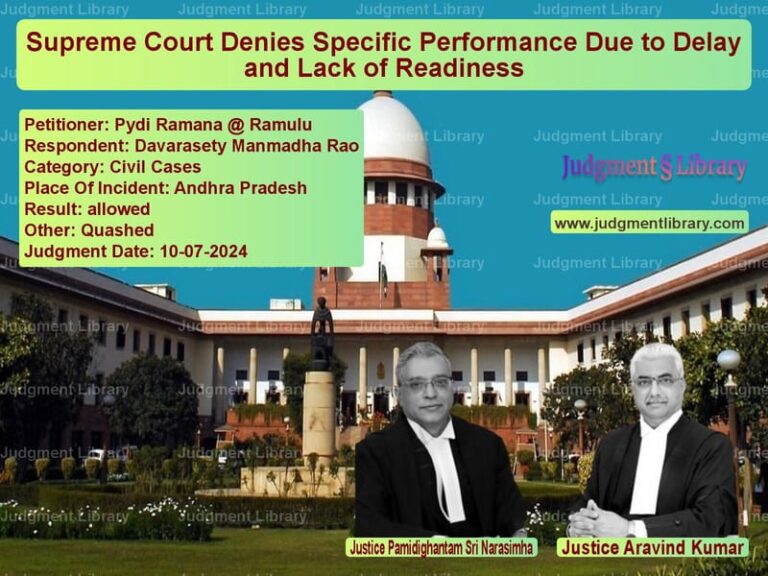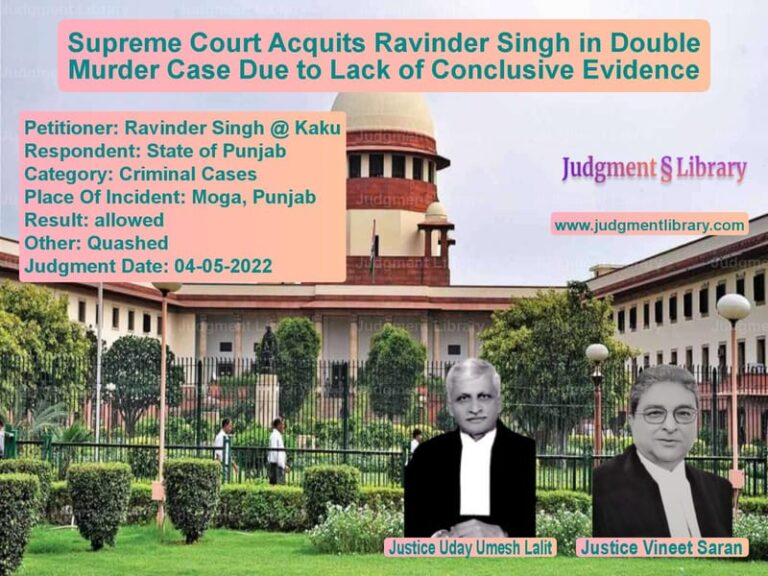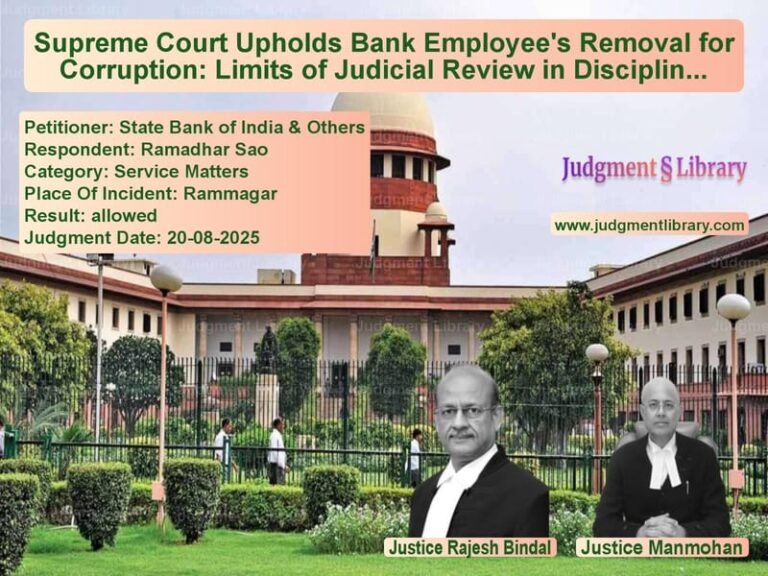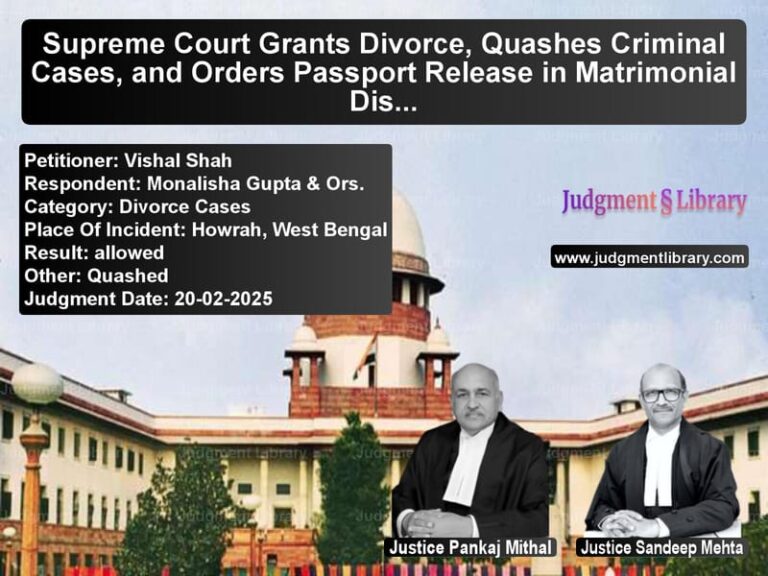Land Ceiling and Property Rights: Supreme Court Restores Ownership in Madhya Pradesh Case
The Supreme Court of India, in Bajranga (Dead) by LRs. vs. The State of Madhya Pradesh & Ors., examined the legality of land acquisition under the Madhya Pradesh Ceiling on Agricultural Holdings Act, 1960. The Court ruled in favor of the appellant, restoring his ownership rights over land that was previously declared surplus under the Act.
This case highlights the importance of procedural compliance in land ceiling laws and the constitutional right to property under Article 300A of the Indian Constitution.
Background of the Case
The predecessor-in-interest of the appellant was the bhumiswami (landowner) of 64.438 acres of agricultural land in Village Bagadua, District Morena, Madhya Pradesh. Under Section 7(b) of the Ceiling Act, a family of five members or less could hold a maximum of 54 acres. Consequently, the competent authority declared 10.436 acres as surplus and initiated acquisition proceedings in 1979.
The appellant challenged the acquisition, arguing that a separate 17 bighas and 7 biswa (approximately 3.306 hectares) of land was already decreed in favor of one Jenobai, his mother-in-law. The trial court dismissed the suit, but the appellate court reversed the decision, ruling in favor of the appellant.
The State of Madhya Pradesh then appealed to the High Court, which ruled against the appellant. Aggrieved, he approached the Supreme Court.
Key Legal Issues Addressed
1. Whether the Competent Authority Followed Proper Procedure
The appellant argued that under Section 11(4) of the Ceiling Act, the competent authority was required to pause proceedings if a title dispute was pending before a competent court. Since Jenobai’s civil suit was ongoing, the authority should have awaited the decision before finalizing the surplus land acquisition.
2. Whether the Civil Court Had Jurisdiction Over the Dispute
The respondents argued that Section 46 of the Act bars civil courts from interfering in matters decided by the competent authority. However, the appellant contended that Section 11(5) allows civil courts to review such orders within three months.
3. Whether the Land Had Already Vested with the State
The respondents claimed that the land had vested with the State under Section 12 of the Act, making the appellant’s challenge irrelevant. However, the appellant argued that since the competent authority failed to follow legal procedures, the acquisition was invalid.
Arguments by the Petitioner (Appellant)
- The land should not have been declared surplus because Jenobai’s ownership reduced the appellant’s total holding below the ceiling limit.
- The competent authority violated Section 11(4) by failing to wait for the civil court’s decision.
- Since the appellant disclosed Jenobai’s pending suit in his land return, the competent authority was obligated to serve her notice before proceeding.
- The civil court had jurisdiction under Section 11(5) to review the competent authority’s decision.
- The High Court erred in ruling against him, as the first appellate court correctly interpreted the law.
Arguments by the Respondent (State of Madhya Pradesh)
- The civil suit between Jenobai and the appellant was collusive, aimed at avoiding land ceiling laws.
- The appellant failed to submit objections during the land ceiling process, making the final decision binding.
- Since the land had already vested with the State under Section 12, the appellant had no legal claim over it.
- The appellate court erred in ruling in favor of the appellant, as the trial court had correctly dismissed the suit.
Supreme Court’s Analysis and Findings
1. Competent Authority Violated Section 11(4)
The Supreme Court ruled that the competent authority had violated Section 11(4) by failing to pause the proceedings until the civil suit was resolved. The judgment stated:
“The proviso to Section 11(4) clearly mandates that if a title dispute is pending before a competent court, the competent authority must await its decision.”
Since the competent authority ignored this requirement, the acquisition process was deemed invalid.
2. Civil Court Had Jurisdiction
The Court rejected the State’s argument that Section 46 barred civil suits, holding:
“Section 46 begins with ‘Save as expressly provided in this Act,’ which means it is subject to Section 11(5). The appellate court correctly allowed the suit.”
Thus, the appellant had a valid right to challenge the acquisition.
3. Land Had Not Validly Vested with the State
The Supreme Court ruled that since the acquisition was procedurally flawed, the land had not vested with the State. The judgment stated:
“The deprivation of property must be in accordance with law. Since the acquisition process was illegal, the land remains with the appellant.”
Supreme Court’s Verdict
- The High Court’s decision was set aside.
- The appellate court’s ruling in favor of the appellant was restored.
- The appellant’s ownership of the disputed land was reinstated.
- The State was restrained from interfering with the appellant’s possession.
Conclusion
This judgment reinforces the importance of procedural compliance in land ceiling laws and the protection of property rights under Article 300A of the Constitution. Key takeaways include:
- Authorities must pause acquisition proceedings if a land title dispute is pending.
- Civil courts retain jurisdiction to review land ceiling decisions under Section 11(5).
- Land does not vest with the State if the acquisition process is procedurally flawed.
- Property rights remain constitutionally protected and cannot be taken arbitrarily.
By upholding procedural fairness, the Supreme Court has reaffirmed the rule of law in land acquisition matters.
Petitioner Name: Bajranga (Dead) by LRs..Respondent Name: The State of Madhya Pradesh & Ors..Judgment By: Justice Sanjay Kishan Kaul, Justice Dinesh Maheshwari, Justice Hrishikesh Roy.Place Of Incident: Morena, Madhya Pradesh.Judgment Date: 19-01-2021.
Don’t miss out on the full details! Download the complete judgment in PDF format below and gain valuable insights instantly!
Download Judgment: bajranga-(dead)-by-l-vs-the-state-of-madhya-supreme-court-of-india-judgment-dated-19-01-2021.pdf
Directly Download Judgment: Directly download this Judgment
See all petitions in Property Disputes
See all petitions in Succession and Wills
See all petitions in Landlord-Tenant Disputes
See all petitions in Specific Performance
See all petitions in Judgment by Sanjay Kishan Kaul
See all petitions in Judgment by Dinesh Maheshwari
See all petitions in Judgment by Hrishikesh Roy
See all petitions in allowed
See all petitions in supreme court of India judgments January 2021
See all petitions in 2021 judgments
See all posts in Civil Cases Category
See all allowed petitions in Civil Cases Category
See all Dismissed petitions in Civil Cases Category
See all partially allowed petitions in Civil Cases Category







